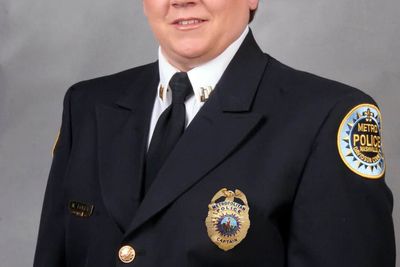Nashville’s newest Deputy Police Chief, Kay Lokey, was 30 years old when she joined the Metro Nashville Police Department (MNPD). It was in November 1996, and she was working part-time at UPS and going to college. But she was, as she put it, “burnt out,” and needed a change.
Her older sister encouraged her to apply with MNPD and she did. And, after filling out an 80-page document that asked “everything about you,” she entered the training academy and faced one of the biggest challenges of her life.
“I made it through, but it was tough,” she said. “I leaned on my family and friends a lot during that process.”
Now she is one of five top division leaders that report directly to the chief of police, and the only female. During her early years, starting out as a young patrol officer, she never hid the fact that she was a lesbian, butshe didn’t push the issue either.
She comes to the job of Deputy Chief after serving in many of the roles that she will now oversee: she spent eight years in the patrol division, then worked as a school resource officer, then moved on to work as a sergeant in the patrol division, and then time at the training academy working with recruits. She has worked in the Central Records Division and served as captain at the Domestic Violence Division. In 2014 she was made commander of the newly established Midtown Hills Precinct.
As Deputy Chief over Administrative Services, Lokey will be responsible for eight large areas, including recruitment and training, and those two areas are where she feels she can most impact on how the police serve the public.
“This is a challenging time for police departments across the county,” she explained. “But tough times bring forth changes and brings character forward. I’m ready to restart the conversation with the community about how we can rebuild trust in the police department.”
In the area of recruitment, she knows that the department has some challenges. It has for several years had at least 100 open positions that it has been unable to fill, and now, in the current climate, she knows that number will only grow. Additionally, the department lacks in certain areas of diversity—less than 10 percent of the department is female, below the national average of 12 percent—and she’s not even sure how many members of the department belong to the LGBTQ community.
“We need more women police officers,” she explained. “Now is the time for women to step up and help make the change we need. I really want to encourage women and the LGBTQ community to step up and be a part of the change we need. We need people who are good problem solvers, who are good at being able to deescalate stressful situations, and who can help rebuild the trust.”
But she also knows that for a long time, law enforcement across the county has been dominated by men and has a reputation for being a very macho environment.
Change is nothing new to Lokey. She grew up with it and has learned to adapt. As an “Air Force brat” she had lived in eight states by the time she was 18. Moving around exposed her at a young age to a variety of people and situations.
“We have to evolve with the times and what society expects from us as police officers,” she said. “We need to treat and recognize people for who they are, not who we want them to be. It’s hard to be a woman in this profession. I know that firsthand. We need to change that.”
One of those changes she hopes to see is a change in the way the police department responds to and manages metal illness and homelessness.
“Does law enforcement need to respond to mental crisis,” she asked. “Do we really have the type of training that we need to manage that?”
She said the city of Nashville needed to come to terms with the mental illness problem, and adapt how we treat the homeless with a robust social services program.
“Maybe one of the solutions is that we have a mental health professional respond on those types of calls with us,” she said.
She also wants to continue to build relationships and have a more robust community policing program, one that helps the police department connect to the communities it serves.
“We already do a lot of great things in the community that people are just not aware of,” she added. “How do we continue to make those connections, build safer neighborhoods and at the same time have people feel safe and welcomed by the police?”
And that is a question that America is struggling to answer.
